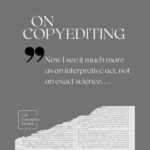Assistant Editor Maggie Su: A writing professor once told me that novels span decades, short stories last weeks, and microfictions are concerned with eternity. This adage holds true for Mark Wagenaar’s “The Gift.” At just four hundred words, the story details a woman’s supernatural ability to touch objects and know the names of their owners. Yet, the piece also transcends its initial conceit as it progresses, becoming a richly layered reflection on migration, resilience, and the “merciless stars.”
To hear Mark read his story, click below:
The Gift
The name would materialize out of nowhere. Like looking at the stars until a constellation formed. As far back as Stephanie could remember, she could pick up a toy, and the owner would come to mind. She told her mother when she was eight, and expected her mother’s “grow up” speech. But she got a knowing nod and a smile instead.
The gift was just a party trick, something to do when everyone tired of drinking games. She would hold a hat or an earring and walk around for a while, until the lights coalesced and the name appeared. Then the questions would begin, the same questions every illusionist faces—except hers was no illusion.
The gift was a party trick, until the eighth month of her first year on the force—she was Officer Costa now—when she was called out to a ranch where unidentified remains had been found in a field. She drove them back to the coroner’s office. She squeezed a red hat in her hand until a sun burst in her head: Jerry S——. The coroner didn’t believe her at first. She had to make the first few next-of-kin phone calls.
She asked for the files of the others in the cooler. Case 0469 wore a green ribbon as a bracelet. Case 0519 carried a dog-eared Psalms in Spanish. Case 0377 kept a grain of rice, just a single grain, inside a hollow cross on the necklace she wore. She got the name Rafael from the blue shoe of a skeleton that had once been scattered—judging by the crooked bones, and the ankle and hand they found a short distance from the rest of the body, it had been reassembled by another migrant. Sometimes she had to wait days for the wind to return a name.
That day, she returned to the precinct, where a Russian general was on the TV, talking about the biggest bomb in the world. The subtitles streaked across the screen: All that is alive merely evaporates. Tomorrow she’d go back out. For those who haven’t evaporated. And hope, and pray, for a little water for the dehydrated, a little mercy for the exhausted, an extra hour of life for every migrant an hour away from the end of his or her life, for every other Costa walking these fields—each field a reliquary beneath the merciless stars.
Mark Wagenaar is the author of Voodoo Inverso (Pollak Prize, University of Wisconsin Press, 2012), The Body Distances (A Hundred Blackbirds Rising) (Juniper Prize, University of Massachusetts Press, 2016), and Southern Tongues Leave Us Shining (Saltman Prize, Red Hen Press, forthcoming summer 2018). He teaches at Valparaiso University, in Indiana.
For more miCRo pieces, CLICK HERE.












